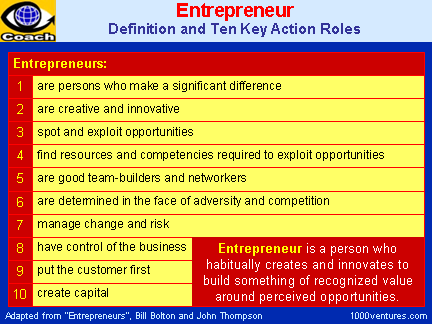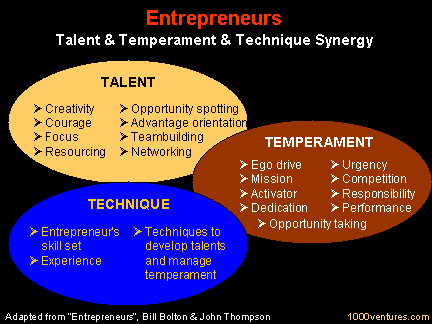|

→
8 Key
Entrepreneurial Questions

|
Who Is the Entrepreneur?
Entrepreneur is a person who
habitually creates and
→
innovates
 to build something of recognized
→
value
to build something of recognized
→
value
 around
perceived
→
opportunities. around
perceived
→
opportunities.
In this definition, all words are key words:
'Entrepreneur'
– can be an individual
entrepreneur, but also an entrepreneurial
team or
even
entrepreneurial organization
'A person'
– emphasizes a personality
rather than a system
'Habitually'
– just cannot stop being an
entrepreneur
'Creates'
– starts from scratch and brings into being something that was not there
before
'Innovates'
– able to overcome obstacles that would stop most people;
turns problems and
risks
into opportunities;
delivers - sees ideas
through to final application
'Builds something'
– describes the
output of the creation and
innovation process
'Of recognized value'
– encompasses
economic,
commercial,
social, or aesthetic value
'Perceived opportunities'
–
spotting the opportunity to exploit an idea that may or may not be
original to the entrepreneur; seeing something other miss or only see in
retrospect.
What Entrepreneurs Are Like?
1. Personality factors
-
born/made ratio
– 50/50, a
synergy
of genetic and environmental influence
-
motivation and emotion
– independence, competitive spirit, challenge,
wealth
-
behavioral characteristics
– perseverance, determination, orientation to clear
goals, need to achieve, opportunity
orientation,
creativity, persistent
problem-solving, risk-taking,
integrity, honesty, internal locus on control
-
personality attributes
–
preferred styles: extrovert/introvert; sensor/intuit;
thinker/feeler; and judger/perceiver
2. Environmental factors
-
family background
– entrepreneurial heritage
-
age and education
– begin entrepreneurial activity early; are not over-educated
-
work experience
– most entrepreneurs first gain some work experience in the line of
business they later
start up
3.
Action factors
-
create and
innovate
– a continuous activity, seeing creative idea through to the end, and
then start climbing another mountain
-
exploit opportunities
– able to see or craft opportunities that other people miss
-
find resources and competencies
– experts at exploiting contacts and sources
-
network
– expertise
oriented; know when they need experts and how to use them
effectively
-
face adversity
–
resolve problems under pressure;
turn problems into opportunities
-
manage risk
– not adventurers, but manageable
risk
takers; their success lies in caution, learning, flexibility and
change during
implementation
-
control the business
– pay attention to details and essential ratios; exercise strategic
control over their business
-
put the customer first
–
listen to the customer and
respond to the customers' feedback
-
creates capital
– financial, social, and aesthetic
|